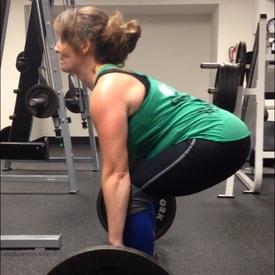Homemade Mayonnaise - Bring out the (very) best!
Mayonnaise is easy to make, and doing it at home allows you to control what goes into it. If you've never tried it, give it a shot! You can add fresh herbs or spices to make a tasty sandwich spread, mix it with chicken or tuna for a superior salad, or use it as a base for salad dressing. And whenever you eat raw eggs, buy them from a farmer you know personally rather than the grocery store. If the hens are healthy, the eggs are very likely healthy too.
Coconut/Olive Oil Mayonnaise
For those trying to avoid highly refined and processed vegetable oils, this is a great alternative. It doesn't contain any animal fats (though I've made it with pastured bacon fat, and it was a SUPERB baconnaise), but coconut and olive oils are among the healthiest plant fats we can consume. And because it contains coconut oil, which is solid at room temperature, this mayonnaise is thicker than most other homemade versions, giving it a more familiar consistency.
1 whole egg, room temperature
1 tsp dijon mustard
2 tsp apple cider vinegar
2 tsp whey (optional)
1/3 cup coconut oil (melted if solid)
1/3 cup extra virgin olive oil
sea salt and black pepper to taste
Place all ingredients except the oils in a blender and pulse until mixed. Mix the oils together, and with the blender (or food processor) on medium speed, add the oil DROP BY DROP until the mayonnaise begins to emulsify. At that point you can add the oil in a slow stream, but be careful not to add too much at once. If you've used the whey (which I highly recommend!), place the mayonnaise in a glass jar with a lid and leave at room temperature for about seven hours, then place in the refrigerator. This short fermentation period will allow the beneficial bacteria in the whey to proliferate, which extends the shelf life of the mayonnaise - long-lasting and probiotic; does it get any better? You can expect the mayonnaise to be good for at least several months (if it lasts that long). Yields one pint.
Nutritional info per 1 Tbs serving - 40 cals - 0 carbs - 4g fat - 0g protein

Coconut/Olive Oil Mayonnaise
For those trying to avoid highly refined and processed vegetable oils, this is a great alternative. It doesn't contain any animal fats (though I've made it with pastured bacon fat, and it was a SUPERB baconnaise), but coconut and olive oils are among the healthiest plant fats we can consume. And because it contains coconut oil, which is solid at room temperature, this mayonnaise is thicker than most other homemade versions, giving it a more familiar consistency.
1 whole egg, room temperature
1 tsp dijon mustard
2 tsp apple cider vinegar
2 tsp whey (optional)
1/3 cup coconut oil (melted if solid)
1/3 cup extra virgin olive oil
sea salt and black pepper to taste
Place all ingredients except the oils in a blender and pulse until mixed. Mix the oils together, and with the blender (or food processor) on medium speed, add the oil DROP BY DROP until the mayonnaise begins to emulsify. At that point you can add the oil in a slow stream, but be careful not to add too much at once. If you've used the whey (which I highly recommend!), place the mayonnaise in a glass jar with a lid and leave at room temperature for about seven hours, then place in the refrigerator. This short fermentation period will allow the beneficial bacteria in the whey to proliferate, which extends the shelf life of the mayonnaise - long-lasting and probiotic; does it get any better? You can expect the mayonnaise to be good for at least several months (if it lasts that long). Yields one pint.
Nutritional info per 1 Tbs serving - 40 cals - 0 carbs - 4g fat - 0g protein

0
Replies
-
Bump0
-
this looks awesome, but I'm curious - is it okay that the egg is never cooked? and what is whey and where would I get it.0
-
bump0
-
this looks awesome, but I'm curious - is it okay that the egg is never cooked? and what is whey and where would I get it.
The egg is a non-issue; ALL mayo is made with raw egg.0 -
Bump0
-
bump0
-
bump0
-
I think commercial mayo is made with pasteurized egg. Any time you use raw egg, you use it at your own risk, however homemade mayo sure is delicious, and this sounds great with coconut oil!0
-
I love homemade mayo! One of my kids won't touch store bought mayo but she likes the homemade stuff. Just takes a minute and tastes so much better! I've never tried it with the apple cider vinegar though. Might have to give that a go.
ETA: you can make your mayo with pasteurized eggs and it will reduce your risk. Or you can use egg substitute but be sure to read the ingredients.0 -
this looks awesome, but I'm curious - is it okay that the egg is never cooked? and what is whey and where would I get it.
The person who replied that all mayo is made with raw egg is (mostly) right - some brands may use pasteurized egg products, but mayonnaise has traditionally been made with raw egg. I use the eggs that my mother's hens lay because I know that they're healthy. I'd recommend using eggs from a trustworthy source - maybe you have a farmers' market nearby, or a friend who brings them in to work to share? If you don't find any right now, check around again in the spring. Those girls will be so busy, people will be begging you to take some.
As for the whey, it's the liquid part of milk, which is separated from the solids, or curds (remember Little Miss Muffet?). The easiest way to get some is to strain some plain yogurt. Pick a brand that's good quality (I'd stay away from low-fat; they don't taste as good after they're strained), with few additives. There shouldn't be many more ingredients than milk and yogurt cultures. Line a big bowl with cheesecloth, pour the yogurt in, then tie the cloth up and let it hang for several hours. The whey will come out into the bowl, and you can keep it in the fridge for a month or so. The yogurt will be thick, like Greek-style yogurt, and you can eat it however you normally would, or use it like cream cheese.
Let me know if you have any questions; I'm happy to offer advice!0 -
this looks awesome, but I'm curious - is it okay that the egg is never cooked? and what is whey and where would I get it.
The person who replied that all mayo is made with raw egg is (mostly) right - some brands may use pasteurized egg products, but mayonnaise has traditionally been made with raw egg. I use the eggs that my mother's hens lay because I know that they're healthy. I'd recommend using eggs from a trustworthy source - maybe you have a farmers' market nearby, or a friend who brings them in to work to share? If you don't find any right now, check around again in the spring. Those girls will be so busy, people will be begging you to take some.
As for the whey, it's the liquid part of milk, which is separated from the solids, or curds (remember Little Miss Muffet?). The easiest way to get some is to strain some plain yogurt. Pick a brand that's good quality (I'd stay away from low-fat; they don't taste as good after they're strained), with few additives. There shouldn't be many more ingredients than milk and yogurt cultures. Line a big bowl with cheesecloth, pour the yogurt in, then tie the cloth up and let it hang for several hours. The whey will come out into the bowl, and you can keep it in the fridge for a month or so. The yogurt will be thick, like Greek-style yogurt, and you can eat it however you normally would, or use it like cream cheese.
Let me know if you have any questions; I'm happy to offer advice!
Thank you! We get our eggs from my mother-in-law who also has chickens. So I would trust them as well. I just didn't know that a raw egg would be good like that for months! who knew - thank you so much! My husband and I barely eat mayo as we are so untrusting of it, but there are times I do need it. Thank you!
also (you can tell how much we love making things ourselves) my husband has been dying to get some cheesecloths - he just loves old things.0 -
That's perfect! You've got the hookup. Happy cooking!0
-
I hate mayonnaise. I despise it with every fiber of my being. Until my girlfriend and I made it for her 30th birthday tapas party. We don't own a hand mixer so I whisked it by hand while she added the oil drop by drop. My arm nearly fell off but we succeeded in making garlic alioli and hot mayo. It tasted wonderful.
I still hate mayo, unless we make it ourselves.0 -
BUMP!0
-
I hate mayonnaise. I despise it with every fiber of my being. Until my girlfriend and I made it for her 30th birthday tapas party. We don't own a hand mixer so I whisked it by hand while she added the oil drop by drop. My arm nearly fell off but we succeeded in making garlic alioli and hot mayo. It tasted wonderful.
I still hate mayo, unless we make it ourselves.
Ha! Glad to hear you had a redeeming experience. How did you season the hot mayo?0 -
Thanks0
-
bump0
-
How do you get 40 cals per Tbsp? If you are adding 10 Tbsp (2/3c) of oil, and one egg, wouldn't that be at the very least 80-100 cals per Tbsp?0
-
bump!0
-
bump0
-
I think commercial mayo is made with pasteurized egg. Any time you use raw egg, you use it at your own risk, however homemade mayo sure is delicious, and this sounds great with coconut oil!
If you purchase eggs from a grocery store in the US, they are pasteurized as well.0 -
Thanks! I'll try this since I just ran out of mayo.0
-
Thanks! I'll try this since I just ran out of mayo.
Where do you find whey?
is it under baking food... just like baking powder jar?0 -
What you ever tried this without whey? Or what kind of whey do you use? I wasn't sure if it was just like the protein whey that you used? I was thinking about making this for my boyfriend.0
-
mmm sounds nice! and much healthier than the crap in the jars!!0
-
Sorry I didn't get back you sooner. I should've checked my threads lately!
I saw a couple of people asking about whey - you can certainly make mayonnaise without it, but the addition helps it to keep longer in the fridge. If you think you'll eat it within two or three weeks, it shouldn't be a problem. And since this recipe only makes about a pint, it shouldn't be hard to use it up before it goes bad (I saw mold growth on mine once, after I forgot about the last little bit in a jar for about three months. In other words, you'll know when you shouldn't eat it anymore!). If you would like to keep the mayonnaise for longer than a month, I'd recommend including the whey. Here is the advice that I gave another lady who had the same question:
"As for the whey, it's the liquid part of milk, which is separated from the solids, or curds (remember Little Miss Muffet?). The easiest way to get some is to strain some plain yogurt. Pick a brand that's good quality (I'd stay away from low-fat; they don't taste as good after they're strained), with few additives. There shouldn't be many more ingredients than milk and yogurt cultures. Line a big bowl with cheesecloth, pour the yogurt in, then tie the cloth up and let it hang for several hours. The whey will come out into the bowl, and you can keep it in the fridge for a month or so. The yogurt will be thick, like Greek-style yogurt, and you can eat it however you normally would, or use it like cream cheese."
The reason why liquid whey (not whey protein powder) helps to preserve the mayonnaise (and other food, for that matter) is because it contains beneficial bacteria (in the case of yogurt, the bacteria is usually L. acidophilus). When you add it to your mayonnaise and then leave the finished product at room temperature for several hours, you give the beneficial bacteria time to multiply, creating lactic acid, which inhibits the growth of undesirable bacteria, mold, yeast, and other organisms. You can also get the same benefit from using unpasteurized vinegar, which contains similar desirable bacteria. I like Bragg's apple cider vinegar, but any unfiltered, unpasteurized product will probably do.
I hope this was helpful! Please let me know if you have any other questions. Happy mayonnaise-making!0 -
bump0
-
BUMP!
My husband is allergic to onions and mayo.
NO IDEA what is in either that he is allergic to.
He can eat any other foods, just not those.
Thinking I should try the homemade mayo, giving him a teensy amount to try and see if it works.
Then I could make all my favorite recipes still! (Or at least Mama's homemade potato salad.)0 -
BUMP!
My husband is allergic to onions and mayo.
NO IDEA what is in either that he is allergic to.
He can eat any other foods, just not those.
Thinking I should try the homemade mayo, giving him a teensy amount to try and see if it works.
Then I could make all my favorite recipes still! (Or at least Mama's homemade potato salad.)
Dang, that's awful! I put onions in everything.
I don't really know much about food allergies, but I believe true allergies are developed to proteins. The only proteins I can think of in the mayonnaise would be the ones in the egg. But if your husband can eat eggs, I guess that's not the case. Some people have unusual food sensitivities, though - maybe that's the case for him. If that's it, who knows! If you end up making this recipe and he can eat it, please let me know! That would be cool. And as for onions - have you ever tried swapping them for shallots? I have a friend who simply doesn't like the overpowering taste of onions, so she substitutes shallots with good results. They probably have fewer sulfides, which might be irritating. Just a thought.0 -
thank you!0
This discussion has been closed.
Categories
- All Categories
- 1.4M Health, Wellness and Goals
- 396.1K Introduce Yourself
- 44.1K Getting Started
- 260.8K Health and Weight Loss
- 176.3K Food and Nutrition
- 47.6K Recipes
- 232.8K Fitness and Exercise
- 448 Sleep, Mindfulness and Overall Wellness
- 6.5K Goal: Maintaining Weight
- 8.6K Goal: Gaining Weight and Body Building
- 153.3K Motivation and Support
- 8.2K Challenges
- 1.3K Debate Club
- 96.4K Chit-Chat
- 2.5K Fun and Games
- 4.4K MyFitnessPal Information
- 16 News and Announcements
- 18 MyFitnessPal Academy
- 1.4K Feature Suggestions and Ideas
- 3K MyFitnessPal Tech Support Questions




















